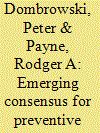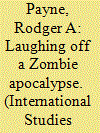|
|
|
Sort Order |
|
|
|
Items / Page
|
|
|
|
|
|
|
| Srl | Item |
| 1 |
ID:
054476


|
|
|
| 2 |
ID:
113855


|
|
|
|
|
| Publication |
2012.
|
| Summary/Abstract |
Major powers are frequently urged to embrace grand strategies tied to particular International Relations theories. In the case of United States foreign policy, scholars generally analyse a well-known set of strategic choices - primacy, selective engagement, offshore balancing, collective security and cooperative security - favoured by relatively mainstream realist and liberal thinkers in International Relations. This article explores the evolution of cooperative security as an idea from its clear ties to liberal and neoliberal international relations theory to its current understanding in world politics, which is surprisingly consistent with many emancipatory ideals of critical International Relations theory. Cooperative security no longer merely implies multilateralism, negotiation and arms control. Rather, security is now more frequently described as indivisible, and genuine cooperation is said to require shared decision-making and consensual practices. Non-governmental organisations are more and more granted a voice in security discussions, as are international institutions. While weapons and warfare remain important security concerns, the cooperative security agenda today includes ideas associated with human security, including environmental calamity, global inequality and hunger.
|
|
|
|
|
|
|
|
|
|
|
|
|
|
|
|
| 3 |
ID:
073057


|
|
|
|
|
| Publication |
2006.
|
| Summary/Abstract |
After u September 2001, the George W. Bush administration declared that the United States had adopted a 'pre-emptive' military doctrine to address new threats posed by terrorists and 'rogue states' armed with nuclear, biological or chemical weapons. However, the so-called 'Bush Doctrine' met substantial international opposition when it was proposed - and even more resistance when it was applied to the case of Iraq. Subsequent events in Iraq have not made the idea any more popular. It is somewhat startling, then, that numerous states and international organisations seem now to support the call to revise long-held international understandings about when force might be used. A sizable number agree that the risk of calamitous surprise attacks, especially with nuclear, biological or chemical weapons, might justify preventive strikes or wars against terrorists or their state sponsors. Anew international norm may thus be under construction, though states continue to disagree about the agents of decision and action.
|
|
|
|
|
|
|
|
|
|
|
|
|
|
|
|
| 4 |
ID:
155294


|
|
|
|
|
| Summary/Abstract |
In recent years, many international relations scholars have been discussing films, books, and television programs featuring zombies, largely because such narratives are thought to provide a compelling metaphor for thinking about a diverse array of contemporary threats. These range from relatively traditional threats posed by violent terrorists to nontraditional threats from epidemics or mass migration. However, because zombie narratives are generally apocalyptic, employing them can provide a misleading and dangerous understanding of international security. By contrast, satirical and comedic zombie stories provide interesting alternative narratives that coincide with the emancipatory objectives of critical security studies. Satirical narratives focusing on elites characteristically critique these powerful figures, often revealing them to be self-centered buffoons. Indeed, satire and black comedy can be quite subversive, reflecting critical and potentially transformative notions—about threats and other dimensions of security politics. Comedies typically center upon ordinary people, emphasize their regular lives, and end happily—aligning with the aspirations of the human security agenda.
|
|
|
|
|
|
|
|
|
|
|
|
|
|
|
|
|
|
|
|
|